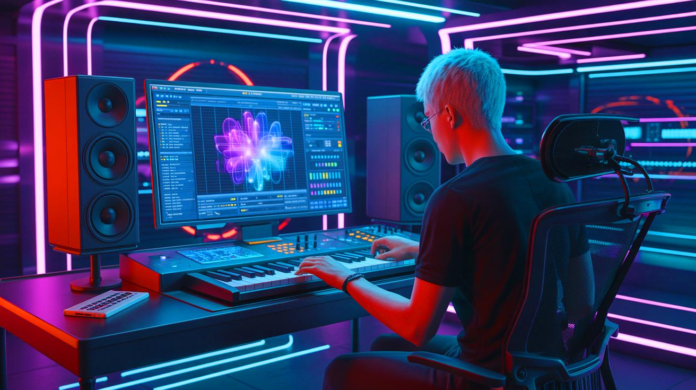Subscribe to our weekly newsletter to receive the very best articles of the moment, handpicked and delivered straight to your inbox.
In a groundbreaking fusion of music and technology, a UK-based firm has unveiled a song created through the remarkable capabilities of quantum computing and artificial intelligence. This innovative track, titled “Recurse,” represents a significant milestone as the world’s first commercial song born from quantum-powered generative AI. The collaboration between tech startup Moth and British electronic artist ILA has resulted in a unique auditory experience that challenges traditional music creation paradigms. As this technology continues to evolve, it raises intriguing questions about the future of creativity and the role of AI in artistic expression.
The creation of “Recurse” was no ordinary musical endeavor. It was achieved through the partnership of Moth and electronic artist ILĀ, utilizing Moth’s proprietary Archaeo platform. Unlike conventional AI systems that depend on extensive, internet-sourced datasets, Archaeo employs parameterized quantum circuits to generate music from small, self-curated inputs. This novel approach ensures creative ownership and originality, while also taking advantage of quantum information theory, which offers far greater flexibility in embedding information than classical computing.
Dr. Ilana Wisby, CEO of Moth, described the track’s release as a “defining moment,” not only for the company but for the future of creativity itself. “Recurse demonstrates the power of quantum AI to support and enhance, and not just take from, artists,” Wisby stated. This approach empowers artists like ILĀ, allowing them to maintain full control over instrumentation, effects, and arrangements, while the AI suggests elements like bass, synth, and drums. German startup IQM also contributed by refining the music using their quantum computers.
“Origami Tech Transforms Everything”: New Shape-Shifting Design Reinvents Stents, Sneakers, and Jet Wings in One Sweep
The development of “Recurse” relies heavily on machine learning, leveraging the unique properties of quantum computers to help AI learn patterns and solve problems more efficiently than traditional computers. Moth’s platform, Archaeo, is based on Quantum Reservoir Computing (QRC), which excels at identifying complex patterns in ILĀ’s music that conventional AI systems might overlook. This synergy between quantum computing and AI underpins the innovative creation of “Recurse,” setting a new standard for technological integration in the music industry.
By harnessing the power of quantum computing, Moth has crafted a platform that not only aids in music production but also enhances the creative process. This blend of cutting-edge technology and artistic expression is paving the way for a new era of music creation, where artists can collaborate with AI to push the boundaries of what’s possible.
“China’s Flying Lego Bot Is Real”: Miniature Microrobot Now Soars and Drives to Conquer Earth’s Harshest Terrain
While the music industry has embraced AI to some extent, the Archaeo platform represents a significant departure from traditional AI tools. Generative AI applications like Suno or Udio can create soundtracks from scratch, but Archaeo’s approach is distinct. It learns from small samples of a specific artist, helping them craft new songs in a way that feels collaborative rather than replaceable. ILĀ expressed appreciation for this technology, stating, “It feels very refreshing to use a technology that has been built to work with you — not simply replace you.”
The involvement of Brazilian composer Eduardo Reck Miranda, known for his research on computational creativity, further underscores Archaeo’s unique approach. As a member of Moth’s board, Miranda has released an album named Qubism, featuring tech-generated songs, showcasing the potential of quantum-powered music. This collaboration highlights the potential for AI to enhance, rather than overshadow, human creativity in the music industry.
“These Incredible Devices Make Holes Vanish”: The Revolutionary Mechanical Cloak That Transforms Structural Components Forever
While the integration of quantum computing and AI in music creation is undeniably impressive, it also prompts reflection on the future of music as a deeply human experience. Tools like Archaeo aim to “empower” artists, yet the increasing reliance on algorithms and abstract computation raises questions about the nature of creativity. As these technologies advance, they offer new possibilities but also challenge traditional notions of music as an emotional and cultural expression.
As the music industry continues to evolve, the balance between human creativity and technological innovation will be crucial. Artists, technologists, and audiences alike must navigate this new landscape, considering the implications of AI-driven music on our cultural and emotional experiences. How will this intersection of quantum technology and music shape the future of artistic expression, and what role will humans play in this rapidly changing world?
Did you like it? 4.3/5 (27)
Subscribe to our weekly newsletter to receive the very best articles of the moment, handpicked and delivered straight to your inbox.
Wow, a quantum-powered song? Sounds like something from a sci-fi movie! 🎶
Subscribe to our weekly newsletter to receive the very best articles of the moment, handpicked and delivered straight to your inbox.
Subscribe to our weekly newsletter to receive the very best articles of the moment, handpicked and delivered straight to your inbox.
Type above and press Enter to search. Press Esc to cancel.
Home Music news “AI Meets Quantum Sound”: This Groundbreaking UK Song Blends Generative Algorithms with...
